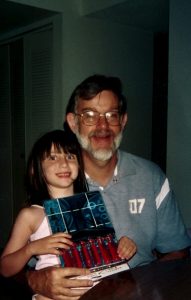Collecting Memories to One Day Look Back on ‘The Way We Were’
Written by |

Buried in my brain is a Proustian memory.
It occurred during my elementary school graduation ceremony when the principal played the song “The Way We Were,” by Barbra Streisand. Any time I hear that song, I am transported back to hearing Streisand’s voice: “Mem’ries/ Light the corners of my mind/ Misty water-colored memories/ Of the way we were.”
Hearing that song makes me feel like I’m 11 years old again, wondering what the future — junior high school and getting older — would be like, and feeling sad that a part of my childhood was about to end.
The topic of “mem’ries” (or “memories,” as us nonsingers refer to them) came up the other day when my wife, Jill, reminisced about her father, Ken, with our daughter, Alexus. As readers of this column may recall, Jill’s dad had Huntington’s disease, which Jill sadly inherited, along with Alexus.
In talking about her father, Jill said the disease changed him physically and altered some of his behaviors, but it didn’t change who he was. What she meant was he couldn’t walk the same, he couldn’t eat, the way he sensed things around him was distorted, and he was often anxious about everything. But Huntington’s didn’t change who he was at his core.
When Jill was growing up, her dad told many dad jokes. Every time she brought a new friend around, Ken would tell the same bad jokes to them. He lovingly referred to these new friends as “fresh meat,” a term I have borrowed in telling my hilarious (trust me, they are hilarious) jokes to new people Jill and I meet, during which, of course, Jill rolls her eyes when she hears the same old jokes being repeated.
In remembering her dad, Jill talked about his strong work ethic and his get-it-done attitude. Even when he wasn’t at work, he always had a project going. Ken learned how to build furniture and restore houses, and tried to pass that down to his children.
Jill looked up to her dad and tried to spend as much time with him as possible. She still likes to talk about being able to do drywall, even though she only liked it because her dad did. These are the memories she likes to remember.
During our conversation, Jill and Alexus shared post-diagnosis memories. Alexus was young when her grandfather was diagnosed, and she remembers the rough times as his condition worsened, but there were many more of her granddad being wonderful.
She remembers waking up one day with a fever. Alexus did not like missing school, so she was upset. After Jill went to work, Ken, who was on disability at the time, got out the Monopoly board and spent the next nine hours sitting at the dining room table playing with Alexus, because he couldn’t stand to see her upset.
The funniest memory Jill has of her father entertaining Alexus was the year she received the game Operation. In this game, players use tweezers to pull plastic ailments out of a patient’s cavities. The goal is to avoid touching the sides. If that occurs, the patient’s red nose lights up and a buzzer sounds. This is not an easy game for anyone, but for someone who is experiencing involuntary, irregular body movements, called choreas, it is impossible.
Ken didn’t care that he lost repeatedly. All that mattered was that Alexus was happy, which made him happy.
Jill plans on remaining Jill as long as possible, but I know I am compiling plenty of memories of the good times we share — and of her being funny, loving, and optimistic, which will remind me of the way she was, because like her dad, that is what she is like at her core.
***
Note: Huntington’s Disease News is strictly a news and information website about the disease. It does not provide medical advice, diagnosis, or treatment. This content is not intended to be a substitute for professional medical advice, diagnosis, or treatment. Always seek the advice of your physician or other qualified health provider with any questions you may have regarding a medical condition. Never disregard professional medical advice or delay in seeking it because of something you have read on this website. The opinions expressed in this column are not those of Huntington’s Disease News or its parent company, Bionews, and are intended to spark discussion about issues pertaining to Huntington’s disease.







Maris Rozas
Me emociona su testimonio.Tengo un hijo con Corea de huntington.
Es doloroso pero espero que el tampoco pierda su esencia.
Carlos Briceño
Gracias por compartir, Sra. Rozas. Mi corazón está contigo sabiendo que tu hijo tiene Huntington's. No tengo ninguna duda de que siempre verás y amarás la esencia de tu hijo. Que Dios esté contigo y con tu hijo.